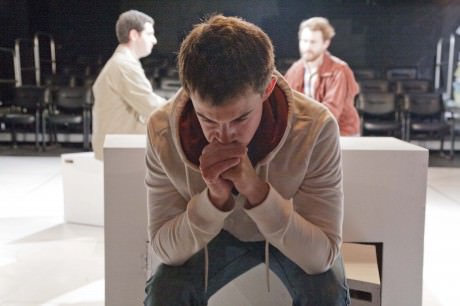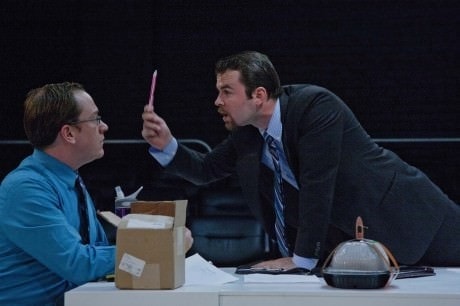About a third of the way into No Rules Theatre Company’s Suicide, Incorporated, there is a showdown over office supplies at the eponymous organization. Perry (Adam Downs), whose singsong positive attitude and slavish devotion to the boss have already marked him as the office brownnose, proudly unveils the new company pens. The CEO, Scott (the charismatic Joe Isenberg), explodes in fury when he sees that they are bright pink. “Who is our target market?” he demands.
“Men,” Perry admits, shamefacedly.
Scott asks Perry how many of their clients over the past three years have been men, then cuts him off before he can stammer out an answer. “Two. And why is that?” He’s now shifted his attention to Jason, the new hire (Brian Sutow, NRTC’s Co-Artistic Director). Jason doesn’t answer and Scott presses him again. “Why is that, Jason?”
After a pause, Jason says, “Because men don’t ask for help.”

It’s a moment that juxtaposes comedy, chaos, and pathos, which makes it a pretty good cross-section of the play as a whole. The stakes for all three men are on display. Scott is relentlessly focused on the success of his business, a service that helps people to perfect their suicide notes. Perry’s entire identity is wrapped up in being Scott’s right-hand man. And Jason, although his motives remain obscure for awhile, has clearly begun his new job in a state of internal conflict.
It’s also a moment that nods at the most interesting theme in Andrew Hinderaker’s script, one that Joshua Morgan references in his Director’s Note. “We live in a society where men are not encouraged to share their feelings,” Morgan writes. “In fact, it’s a sign of weakness if they do.” He and his excellent cast investigate this phenomenon with compelling specificity. The savvy, fast-talking Scott, whose entire business is built on helping others express their most difficult feelings, is at a loss for words when tragedy strikes his own life. Isenberg’s tightly compressed lips and futile, awkward, fingers -outstretched attempt at a shrug suggest a man so burdened with unexpressed feeling he can barely move. When someone asks if he‘s okay, he chirps brightly that he‘s fine. It’s an acting moment that supports the playwright’s thesis and undermines a central character‘s pretensions at one stroke.
At a different extreme is the nervy, fragile Norm (Spencer Trinwith), a rare male client who represents a potential gold mine to Scott and a life to be saved to Jason. Norm is torrentially verbal in his editing sessions with Jason, and in Trinwith’s terrific performance his desperation for release battles constantly with his embarrassment and distrust. Even as he relates his descent into suicidal depression, Norm occasionally releases a strangled laugh or presses his hands into his eyes as if to keep the tears in, poignantly conveying the fact that – even in a scenario where you are paying someone to edit your suicide note – there’s still a strong social obligation to mask your pain.

Morgan astutely guides his actors away from the maudlin and towards the comic, or at least active, elements of their characters’ stories. Downs keeps Perry’s fey absurdity grounded and genuine, and Dylan Jackson, as Jason’s little brother, delivers an appealing blend of playfulness and vulnerability in a role that could easily become contrived. His climactic scene with Jason is an instance of Hinderaker’s cleverness actually enhancing its pathos, and Jackson is devastating in it.

Sutow’s understated performance serves him especially well in Jason’s solo scene at a suicide prevention call center; I had chills as I listened to him counsel the unheard caller.
Morgan’s only misstep is in staging an important late scene in a corner of the stage that is difficult to see from two sides of the theater. (The impatience I felt at missing the action, though, is its own tribute to his otherwise skilful stewardship.) His pacing is flawless; the dialogue is rapid-fire except for a few thoughtfully chosen, well-earned silences, and the transitions are crisp and rhythmic (assisted by Jason Waggoner’s pulsing soundtrack and Steven Royal’s clever, versatile set). Chelsey Schuller’s lucid costumes and Andrew Dorman’s decisive lighting round out this strong, sure-handed production. Howard Wahlberg has some cameos as Officer James.
In their persuasive rendering of what Morgan calls the “societal epidemic” of male silence, Hinderaker, Morgan and the all-male cast certainly offer a rousing, and hopeful, counterexample -an articulate and expressive exploration of one of the darkest subjects any of us have to face.
Running Time: Approximately 90 minutes, with no intermission.
Suicide, Incorporated plays through June 23, 2012 at H Street Playhouse – 1365 H St. NE, in Washington, DC. For tickets, purchase them online.
[contact-form] [contact-field label=”Name” type=”name” required=”true” /] [contact-field label=”Email” type=”email” required=”true” /] [contact-field label=”Website” type=”url” /] [contact-field label=”Comment” type=”textarea” required=”true” /] [contact-field label=”Rate the Show From 1 to 5 Stars” type=”text” /] [/contact-form]





